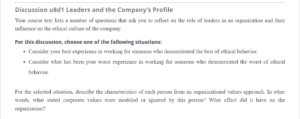Leaders and the Company’s Profile
Consider what has been your worst experience in working for someone who demonstrated the worst ethical behavior.
I was once a part of an organization where the leader expressed unethical behaviors, which influenced the work of all employees. Lateness was highly discouraged; hence, the supervisor was supposed to monitor employee lateness and reprimand employees who were persistent with their lateness. The supervisor had a friend who was late almost daily, but they were never reprimanded for violating the rules, while other employees were. This was a demonstration of poor ethics by this leader.
Are you seeking an unpublished edition of “Leaders and the Company’s Profile”? Feel free to connect with us should you require any further information.
The supervisor violated the organizational values of equality, justice, and fairness through favoritism. When an organization creates rules, they should apply to everyone regardless of their relationship with the leaders. All people deserve the same kind of justice and fairness and be treated equally, as this is the ethical way of managing employees. When a leader is not ethical, their actions affect the behavior and attitudes of the employees negatively (Weiss, 2014).
In this case, the employees started becoming intentionally disrespectful because they had a reason to complain about the justice in rules implementation. Employees also became less motivated because they believed the favoritism was reflected in other areas, such as performance management. They believed that the management evaluated their performance based on their relationships with the leaders. People who knew the supervisor were likelier to get a higher performance rating. Even though this may not have been true, it is what people had been led to believe because of one supervisor’s actions. Therefore, this demonstrates how a leader’s unethical actions can negatively influence employees’ respect for the rules and motivation to work hard. In turn, the organization’s performance may diminish.
Similar Post: Adaptive Structures
References
Weiss, J. W. (2014). Business ethics: A stakeholder and issues management approach. Berrett-Koehler Publishers.
ORDER A PLAGIARISM-FREE PAPER HERE
We’ll write everything from scratch
Question
Discussion u8d1 Leaders and the Company’s Profile
Your course text lists several questions that ask you to reflect on the role of leaders in an organization and their influence on the company’s ethical culture.

Leaders and the Company’s Profile
For this discussion, choose one of the following situations:
-
- Consider your best experience working for someone who demonstrated the best ethical behavior.
- Consider what has been your worst experience in working for someone who demonstrated the worst of ethical behavior.
For the selected situation, describe the characteristics of each person from an organizational values approach. In other words, what stated corporate values were modeled or ignored by this person? What effect did it have on the organization?
Note: Do not use real organizations or personal names in your post.
Refer to the Discussion Participation Scoring Guide for posting expectations.
Discussion Participation Scoring Guide
| Discussion Participation Grading Rubric | ||||
| Criteria | Non-performance | Basic | Proficient | Distinguished |
| Applies relevant course concepts, theories, or materials correctly. | Does not explain relevant course concepts, theories, or materials. | Explains relevant course concepts, theories, or materials. | Applies relevant course concepts, theories, or materials correctly. | Use examples or supporting evidence to analyze course concepts, theories, or materials correctly. |
| Collaborates with fellow learners, relating the discussion to relevant course concepts. | Does not collaborate with fellow learners. | Collaborates with fellow learners without relating the discussion to the relevant course concepts. | Collaborates with fellow learners, relating the discussion to relevant course concepts. | Collaborates with fellow learners, relating the discussion to relevant course concepts and extending the dialogue. |
| Applies relevant professional, personal, or other real-world experiences. | Does not contribute professional, personal, or other real-world experiences. | Contributes professional, personal, or other real-world experiences but lacks relevance. | Applies relevant professional, personal, or other real-world experiences. | Applies relevant professional, personal, or real-world experiences to extend the dialogue. |


